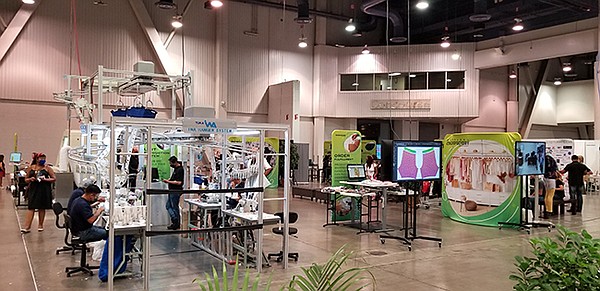During Sourcing at MAGIC, the show’s centerpiece was the Communal Microfactory powered by Tukatech, which also relied on services from the Los Angeles software company’s partners Kornit and Fabfad Inc.
TRADE SHOWS
Sourcing at MAGIC Raises Hopes for Quality, Nearshoring and Sustainability
As part of the Informa Markets Fashion schedule of apparel-industry shows, Sourcing at MAGIC was hosted at the Las Vegas Convention Center Aug. 8–11. For Andreu David, event director for Sourcing at MAGIC, this hybrid on-site/virtual production was the fashion professional’s first time managing the show in a physical space, and the focus was on sustainability.
“Creating this hybrid opportunity where they can physically represent themselves at our show through samples onsite, in addition to being virtually connected with our audience and our buyers through our digital platform is what was needed,” David said, adding that the online component would run until Oct. 1.
Working with Dr. Cindy J. Lin, chief executive officer and founder of the sustainable-certification group Hey Social Good, David created the Sustainable Alternatives Gallery for vetted businesses that have passed the responsible-manufacturing assessment.
“A lot of them can’t afford the big-name certs,” Dr. Lin said. “The reason we are affordable is that we apply machine learning and data analytics versus having a person come through your site and giving you a 100-page survey to respond to.”
Exhibitor Chupa Coules of The Hague, Netherlands–based Continuum Buying Agency attended the show to represent brands from India.
“There are so many beautiful products that come out of India that are already sustainable. It’s all natural anyway,” Coules said. “It’s a matter of where it’s sourced and how it’s picked.”
As a downtown Los Angeles manufacturer, Richard Harding of Randl USA was pleasantly surprised at the warm reception the company received during its first experience at Sourcing.
“Ninety percent of the people we spoke to here that have been doing this for a while want to leave China and other parts of Asia to do things here,” Harding said. “A huge portion of it has to do with the fact that getting things from Asia is a huge problem these days.”
The star of the Sourcing at MAGIC show was the Communal Microfactory powered by the Los Angeles software provider Tukatech and was built with partners Kornit, the Israel-based printing-solutions company, and the L.A. manufacturer Fabfad Inc. Sean Saberi, CEO of Fabfad, revealed that this microfactory served as a preview to a similar concept that is being built at the company’s Los Angeles location.
“Students or designers who don’t have an office can be at the factory to use Tutatech software and pay a monthly fee, and that monthly fee gives them access to everything we have. They can physically see it right then and there,” Saberi said. “They will have access to millions of dollars’ worth of equipment without paying for it.”
The microfactory was a source of inspiration for Gina Robinson of the Las Vegas brand Gypsy Revolution as the leatherworker shifts her brand into more-responsible production.
“When I saw the Tukatech booth, it made me want to add clothes to my collection,” Robinson said. “I am changing my company name from Gypsy Revolution to Heroes of the Revolution. Originally, the revolution part of the name is the recycled, sustainability part.”
Prodigy Wear Clothing Line owner James Gay of Canton, Mich., searched for partners to expand his women’s and men’s lines.
“It’s mostly urbanwear and streetwear,” Gay said. “I want to expand my women’s line to leggings and workout wear. We’re also going into jeans. AZ Apparel stood out with their jogging outfits. Diagonal Fits—the quality of their material was on the high end. I want to do men’s jogging outfits.”






















